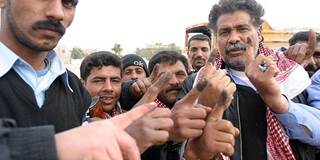Following the just completed elections, Iraq's new government must resolve fundamental constitutional questions, rebuild civil society, reform state institutions, reconstruct the economy, and end the waste and corruption in the oil sector. But perhaps the most intractable challenge of all is bridging the sectarian rift between the country’s Shia and Sunni citizens.
BAGHDAD – Iraq’s recent parliamentary election, the first since United States troops left the country in 2011, was held amid a rising tide of violence that is fast approaching the levels experienced during the 2005-2007 insurgency. Can the new government restore order and address the many immense challenges that Iraq faces?
The challenges are indeed daunting. The authorities must resolve fundamental constitutional questions (such as whether Iraq should be a federal state or a confederation), rebuild civil society, reform state institutions, reconstruct the economy, and end the waste and corruption in the oil sector.
But perhaps the most intractable challenge of all is bridging the sectarian rift between the country’s Shia and Sunni citizens. These fissures are mirrored in other Arab countries (such as Syria, Lebanon, the Gulf countries, and Yemen) and, increasingly, in the wider Muslim world (including Pakistan, Malaysia, and Indonesia). Is this a historical aberration, or are Islam’s two largest sects condemned to perpetual mutual hostility?

BAGHDAD – Iraq’s recent parliamentary election, the first since United States troops left the country in 2011, was held amid a rising tide of violence that is fast approaching the levels experienced during the 2005-2007 insurgency. Can the new government restore order and address the many immense challenges that Iraq faces?
The challenges are indeed daunting. The authorities must resolve fundamental constitutional questions (such as whether Iraq should be a federal state or a confederation), rebuild civil society, reform state institutions, reconstruct the economy, and end the waste and corruption in the oil sector.
But perhaps the most intractable challenge of all is bridging the sectarian rift between the country’s Shia and Sunni citizens. These fissures are mirrored in other Arab countries (such as Syria, Lebanon, the Gulf countries, and Yemen) and, increasingly, in the wider Muslim world (including Pakistan, Malaysia, and Indonesia). Is this a historical aberration, or are Islam’s two largest sects condemned to perpetual mutual hostility?